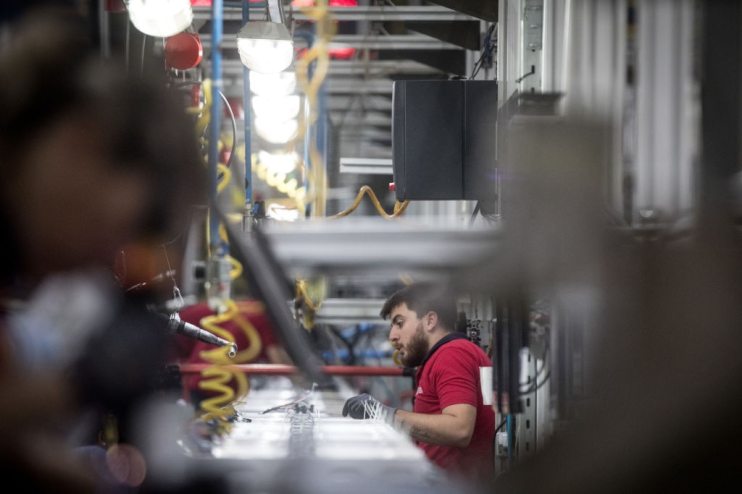Weekend Read: Ailing business investment will dampen the economy’s post-Covid prospects

The good pandemic-related news continued to emerge last week.
Latest figures from the Office for National Statistics shows output jumped 4.8 per cent in the second quarter of this year, driven by the lifting of Covid restrictions on sectors that rely on face-to-face and social contact to generate income.
The services industry – which accounts for around 80 per cent of the UK economy – roared back to life as consumers rushed to capitalise on their newfound freedoms by heading to pubs, bars, restaurants and high streets.
The kickoff of Euro 2020 during the final month of the quarter provided an extra fillip as people watched England progress through the early stages of the tournament.
While this is all clearly very good news, one figure in the ONS’ data dump is a cause for concern – business investment.
The ONS said investment by firms has risen 2.4 per cent in the second quarter, an outlier in the string of historically high economic data of late.
This low rate of growth is an indication of the severely uncertain trading environment firms found themselves operating in throughout April, May and June.
Many businesses likely held off from spending on long term projects until a clearer picture on demand has emerged.
Thomas Pugh, UK economist at RSM, said: “For much of the second quarter the economic outlook was highly uncertain, this would have weighed on appetite for business investment.”
“Why commit to a big project early when in a few weeks the outlook would be much clearer,” he added. Why indeed.
It is easy to see why firms have kicked investment into the long grass given the havoc Covid has wreaked on demand.
Not only were companies coping with more fragile economic forecasts, widespread shortages of raw materials and commodities as a result of supply chains buckling under the weight of soaring global demand as economies emerge from Covid restrictions intensified inflationary pressures during the second quarter.
This is likely to have made investment decisions financially unviable due to the costs outweighing the potential gains.
Yael Selfin, chief economist at KPMG UK, said: “One of the factors potentially halting investment at the moment is supply chain bottlenecks, which make it harder for businesses to realise some of their investment plans.”
Even if they do become available, firms are struggling to get their hands on capital goods amid intense competition.
Super-deduction is yet to emerge in the data
What is more concerning is the lack of impact the super-deduction has had on stimulating business investment during the second quarter.
The intended outcome of the tax-break is to prompt companies to buy things such as plant, machinery and other capital goods that enhances their output levels.
The policy enables companies to deduct 130 per cent of the cost of buying qualifying capital goods off their taxable income. The Treasury says this “will give companies a strong incentive to make additional investments, and to bring planned investments forward.”
That has not been the case in the latest round of data.
Moreover, there is strong possibility businesses will simply front load their investment spending over the period the super-deduction applies (the measure ends in March 2023) and then drop future investment spending.
As a result, taken over the course of a five or six-year period, total investment spend will hover near levels it would have been even without the tax-break.
But, economists have stressed it is too early to judge the measure.
Ian Stewart, chief economist at Deloitte, said: “The super deduction was only announced in March, the lockdown ran through much of the second quarter and capex tends to lag. We’ll have a better feel for this next year.”
Time will tell it seems.
Capturing productivity gains is key to feeding the economy after Covid
The UK economy has struggled with a productivity malaise over the last decade. The Treasury attributes our weak productivity growth since the financial crisis to “historically low levels of business investment compared to our peers.”
Business investment expands the productive capacity of the economy by improving productivity levels. In other words, the UK can produce more things with fewer resources.
The composition of what types of things businesses need to be investing in to make their workforce more productive has drastically changed. IT equipment and technology are areas where relatively low levels of spending are needed to yield significant productivity advances.
Pugh noted: “Firms need to be investing in their digital infrastructure and technology to allow them to take advantage of, and compete, in a world where technologies, like AI, are going to become increasingly important.”
There are encouraging signs indicating the Covid crisis has accelerated spend on the types of goods Pugh highlights. Investment in IT equipment in the second quarter was 11.2 per cent higher than in final quarter of 2019, before Covid struck.
The super-deduction seems to have stimulated spending on IT equipment as firms strengthen their digital infrastructure in response to consumers conducting a greater share of economic activity online, the ONS said.
The present difficulties businesses are encountering as a result of global bottlenecks should prompt some to consider investing in making their supply chains more local.
Selfin said businesses can benefit from diversifying their supply chains “so [they] have access to supplies in different regions in the event production needs to stop.”
So, there are signs of hope in the form of robust IT spending and the economy creeping nearing to its pre-Covid size.
Although the short term goal should be to get GDP back to full strength, the long term goal needs to focus on eliminating sluggish economic growth driven by poor productivity gains exhibited prior to the onset of Covid.
If the UK economy is to be more resilient to future shocks, business investment needs to ramp up.